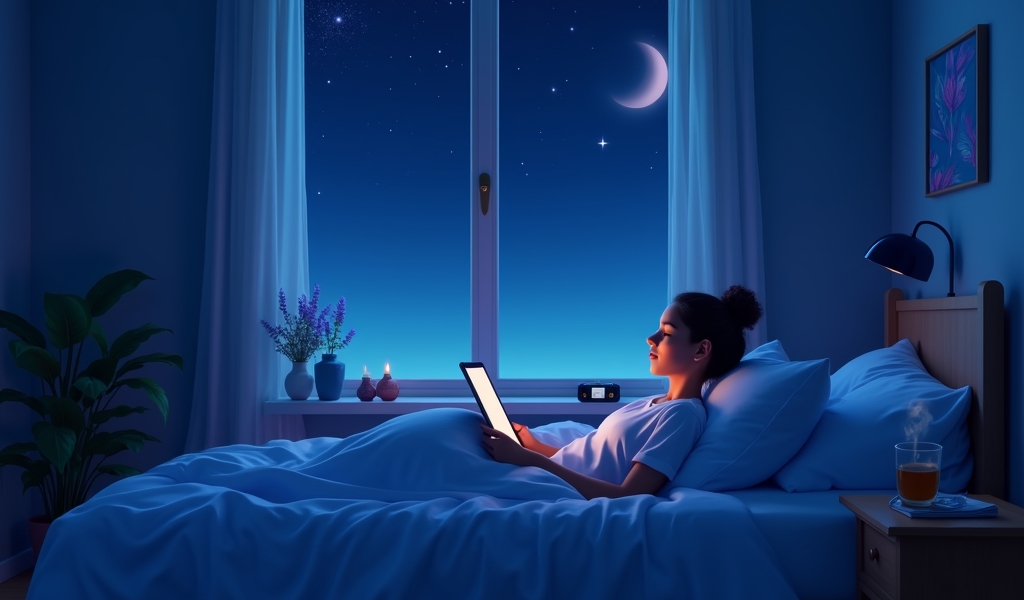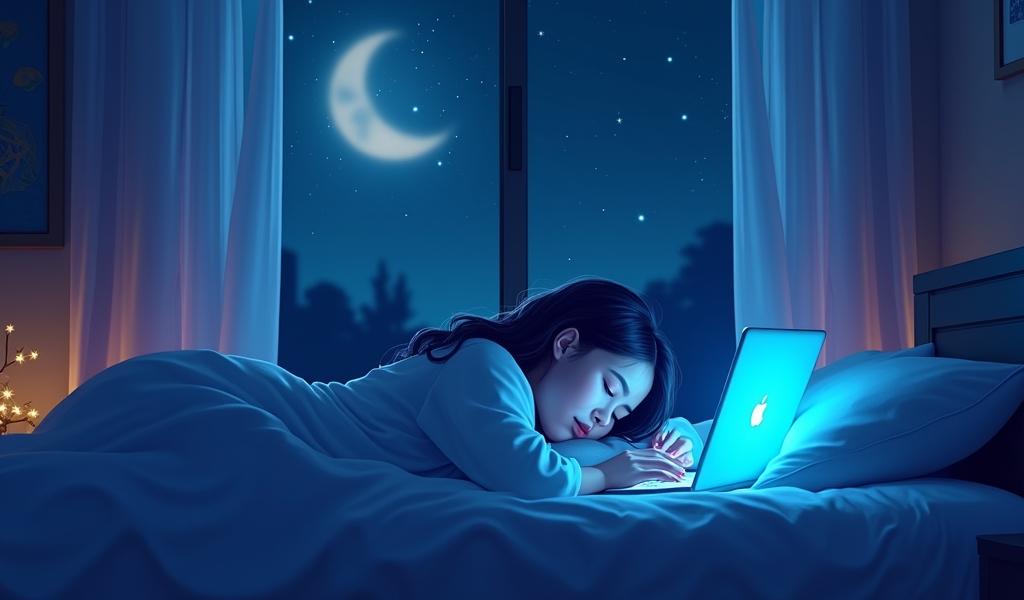Overview
This comprehensive article presents seven evidence-based online insomnia treatments, ranging from CBT-I apps and telehealth consultations to digital sleep tracking, guided meditation, sleep hygiene courses, light therapy, and virtual support communities. Research shows these digital interventions can be as effective as in-person treatments, offering accessible, flexible, and affordable options for the 30% of adults suffering from insomnia while emphasizing that a personalized, multi-method approach typically yields the best results within 2-6 weeks of consistent practice.
Table of Contents
- Understanding Insomnia: More Than Just Sleepless Nights
- The Rise of Online Insomnia Treatments
- Proven Method #1: Cognitive Behavioral Therapy for Insomnia (CBT-I) Apps
- Proven Method #2: Telehealth Sessions with Sleep Specialists
- Proven Method #3: Digital Sleep Tracking and Analysis
- Proven Method #4: Guided Meditation and Relaxation Programs
- Proven Method #5: Online Sleep Hygiene Courses
- Proven Method #6: Light Therapy and Circadian Rhythm Adjustment
- Proven Method #7: Virtual Support Groups and Communities
- Creating Your Personalized Online Insomnia Treatment Plan
- Conclusion: Better Sleep Is Within Reach
- Frequently Asked Questions
Are you one of the 70 million Americans who struggle with sleep disorders? Insomnia affects approximately 30% of adults, making it the most common sleep disorder in the United States. Beyond the frustration of staring at the ceiling night after night, insomnia can significantly impact your health, mood, productivity, and overall quality of life. The good news? You no longer need to suffer in silence or wait months for an in-person specialist appointment. This article explores seven proven online insomnia treatment options that can help you reclaim your nights and finally get the restorative sleep you deserve.
Understanding Insomnia: More Than Just Sleepless Nights
Insomnia isn’t a one-size-fits-all condition. There are several types, including onset insomnia (difficulty falling asleep), maintenance insomnia (trouble staying asleep), acute insomnia (short-term), and chronic insomnia (long-term, lasting three months or more).
The causes are equally diverse – stress, anxiety, depression, medications, poor sleep habits, or underlying health conditions can all contribute to sleep disturbances. Many people try over-the-counter remedies or prescription medications, but these often address symptoms rather than root causes, sometimes creating dependency without solving the actual problem.
The Rise of Online Insomnia Treatments
The digital health revolution has transformed how we approach sleep disorders. Online insomnia treatments offer several advantages over traditional methods:
- Accessibility from the comfort of your home
- No need to travel to appointments
- Often more affordable than in-person therapy
- Flexible scheduling that fits your lifestyle
- Privacy for those who feel stigmatized by sleep issues
Research increasingly supports the effectiveness of digital interventions. A 2021 meta-analysis published in the Journal of Medical Internet Research found that online cognitive behavioral therapy for insomnia was just as effective as face-to-face treatment for many patients.

Proven Method #1: Cognitive Behavioral Therapy for Insomnia (CBT-I) Apps
CBT-I is considered the gold standard for treating insomnia, addressing the thoughts and behaviors that prevent good sleep. Digital CBT-I programs deliver this effective therapy through structured modules, sleep diaries, and personalized recommendations.
Top platforms include Sleepio, Somryst (FDA-approved), and CBT-i Coach. These apps guide users through identifying sleep-disruptive thoughts, establishing regular sleep schedules, and implementing relaxation techniques. Studies show digital CBT-I can reduce the time it takes to fall asleep by 20-30 minutes and increase total sleep time by 30-60 minutes per night for many users.
According to the National Sleep Foundation, CBT-I works for 70-80% of patients and typically produces results within 4-8 weeks of consistent practice.
Proven Method #2: Telehealth Sessions with Sleep Specialists
Virtual consultations connect you with board-certified sleep specialists without leaving home. At Dr. Telx, our network includes experienced sleep medicine physicians who can evaluate your symptoms, recommend diagnostic tests if needed, and create personalized treatment plans.
Finding qualified specialists is simple through our telehealth platform. Your first virtual session typically includes a comprehensive sleep history, discussion of symptoms, and exploration of contributing factors. Many insurance plans now cover telehealth sleep consultations, making expert care more accessible than ever.
Proven Method #3: Digital Sleep Tracking and Analysis
Wearable technology has revolutionized sleep tracking. Devices like Fitbit, Apple Watch, Oura Ring, and dedicated sleep trackers monitor your sleep stages, breathing patterns, heart rate, and movement throughout the night.
The data provides insights into sleep quality, duration, and disturbances you might not notice consciously. Many accompanying apps offer sleep scores and personalized recommendations based on your patterns. While not diagnostic tools, these trackers help identify trends and measure improvements as you implement other treatments.
Proven Method #4: Guided Meditation and Relaxation Programs
The science is clear: meditation and mindfulness practices reduce the hyperarousal that often prevents sleep. Digital platforms have made these practices more accessible than ever.
Apps like Calm, Headspace, and Insight Timer offer dedicated sleep meditations that guide your mind away from racing thoughts and toward a state conducive to sleep. Creating a regular pre-sleep meditation routine signals to your brain that it’s time to wind down. Many users report falling asleep faster and experiencing fewer nighttime awakenings after just a few weeks of consistent practice.
Proven Method #5: Online Sleep Hygiene Courses
Sleep hygiene—the habits and practices that create optimal conditions for quality sleep—forms the foundation of any successful insomnia treatment. Online courses provide structured education on these principles.
Digital platforms like Coursera, Udemy, and specialized sleep websites offer comprehensive sleep hygiene education. These courses cover environment optimization (temperature, light, noise), daily habits that affect sleep (caffeine, exercise timing, screen use), and consistent sleep-wake scheduling. Implementing these evidence-based practices can resolve mild to moderate insomnia without medication for many people.

Proven Method #6: Light Therapy and Circadian Rhythm Adjustment
Your internal body clock strongly influences sleep timing and quality. Online tools can help regulate this system through strategic light exposure.
Apps like f.lux and Night Shift automatically adjust your devices’ blue light output based on time of day, while smart lighting systems can be programmed to support your natural circadian rhythm. For those with delayed or advanced sleep phase disorders, specialized light therapy devices with accompanying apps can gradually shift your sleep schedule to a more desired time.
Proven Method #7: Virtual Support Groups and Communities
Sometimes, knowing you’re not alone in your sleep struggles makes all the difference. Online communities provide validation, encouragement, and practical tips from others facing similar challenges.
Platforms like Reddit’s r/insomnia, Facebook groups dedicated to sleep disorders, and specialized forums connect you with a community that understands your experience. Many participants report that these connections reduce the anxiety about sleeplessness itself—often a major factor perpetuating insomnia.
Creating Your Personalized Online Insomnia Treatment Plan
The most effective approach often combines multiple methods. You might start with a telehealth consultation to rule out medical causes, then implement CBT-I techniques while improving your sleep hygiene and incorporating evening meditation.
Set realistic expectations—most evidence-based approaches take 2-6 weeks to show significant improvements. Be consistent with your chosen methods, track your progress, and don’t hesitate to adjust your approach if needed.
If your insomnia persists despite these interventions, a follow-up telehealth appointment can help determine if additional treatments, including medication or more specialized therapy, might be beneficial.
Conclusion: Better Sleep Is Within Reach
Insomnia may feel insurmountable when you’re in the midst of it, but these seven proven online insomnia treatment options offer effective paths to better sleep. From the gold standard of CBT-I to the supportive community of fellow insomnia sufferers, digital tools have made quality insomnia care more accessible than ever.
We’re committed to helping you find the sleep solutions that work for your unique situation. Remember that recovering from insomnia is rarely an overnight process—it takes time and consistent effort, but the reward of restorative sleep is well worth the journey.
Take that first step tonight. Your well-rested future self will thank you.
Frequently Asked Questions
Is online insomnia treatment as effective as in-person care?
Yes, research shows that online insomnia treatments, especially digital CBT-I programs, can be equally effective as in-person treatment for many patients. A 2021 study in the Journal of Sleep Research found comparable outcomes between virtual and face-to-face CBT-I. The key is consistency and following the program as directed. Some patients with complex sleep disorders may still benefit from in-person evaluation, but many can achieve significant improvement through online methods.
How long does it typically take to see results with online insomnia treatment?
Most evidence-based online insomnia treatments require 2-6 weeks of consistent practice before significant improvements occur. CBT-I typically shows measurable benefits within 4-8 weeks. However, some people notice initial improvements in as little as one week after implementing better sleep hygiene practices or relaxation techniques. Remember that recovery isn’t always linear—you might experience better nights and occasional setbacks along the way.
Are online insomnia treatments covered by insurance?
Insurance coverage for online insomnia treatment has expanded significantly, especially since the COVID-19 pandemic. Many major insurers now cover telehealth consultations with sleep specialists and some digital therapeutic programs like prescription-based CBT-I apps. Coverage varies by plan and provider. Check with your insurance company about specific coverage for digital therapeutics, telehealth consultations, and other online treatment options.
Can I use online insomnia treatment if I’m already taking sleep medication?
Absolutely. Many patients successfully combine online insomnia treatments with medication. In fact, therapies like CBT-I can work well alongside medications and potentially help reduce your reliance on them over time. Always inform your healthcare provider about all treatments you’re using, including apps and online programs. This ensures coordinated care and helps avoid potential conflicts between different approaches.
What’s the best online insomnia treatment for someone who’s tried everything?
For treatment-resistant insomnia, a multi-faceted approach is often most effective. Start with a telehealth consultation with a sleep specialist to rule out underlying medical conditions. Then, consider a comprehensive CBT-I program combined with consistent sleep tracking to identify patterns. Paradoxical intention (purposely staying awake) and acceptance-based approaches can help break the cycle of sleep anxiety. Remember that even people with years of insomnia can improve with the right combination of treatments and consistency.

